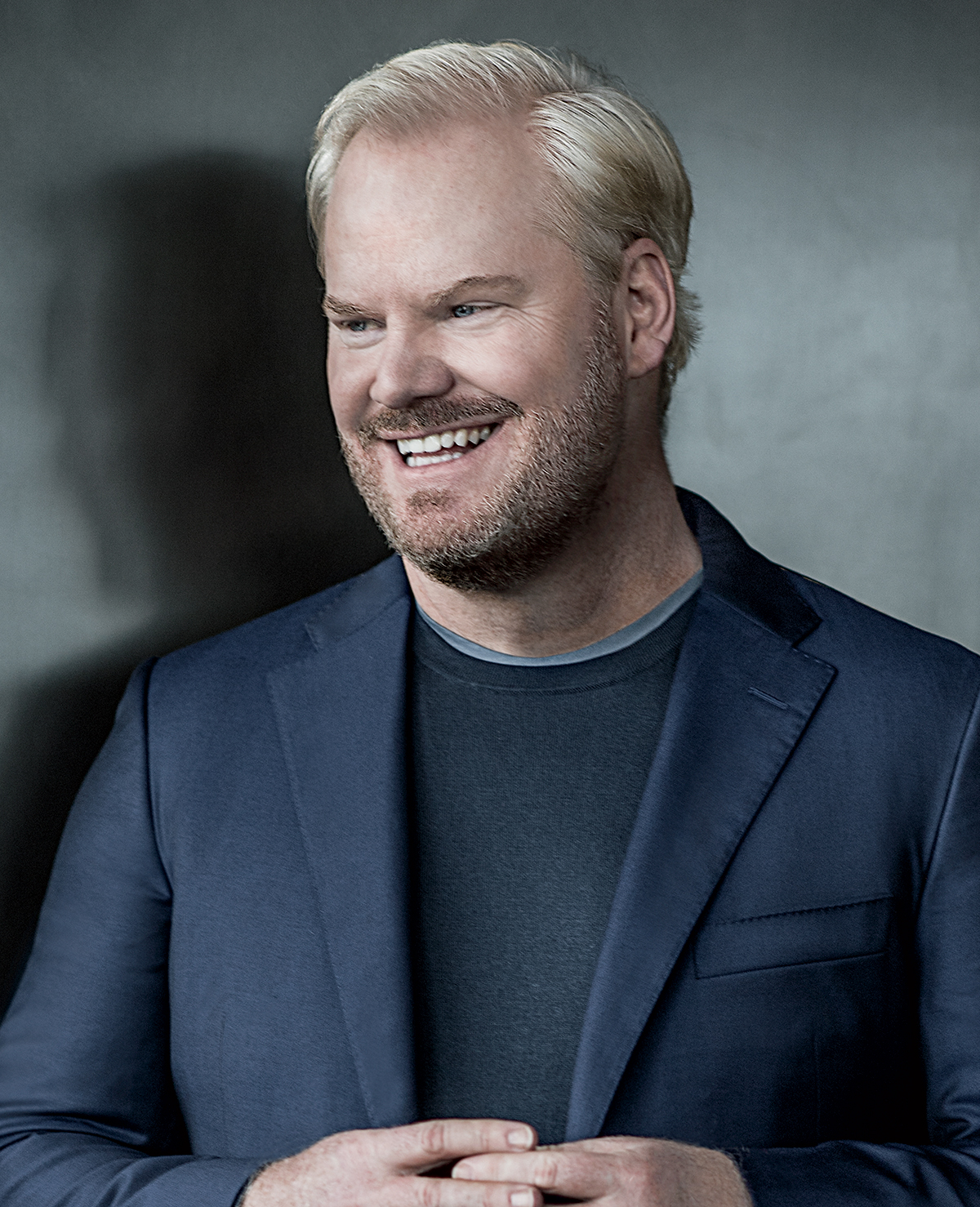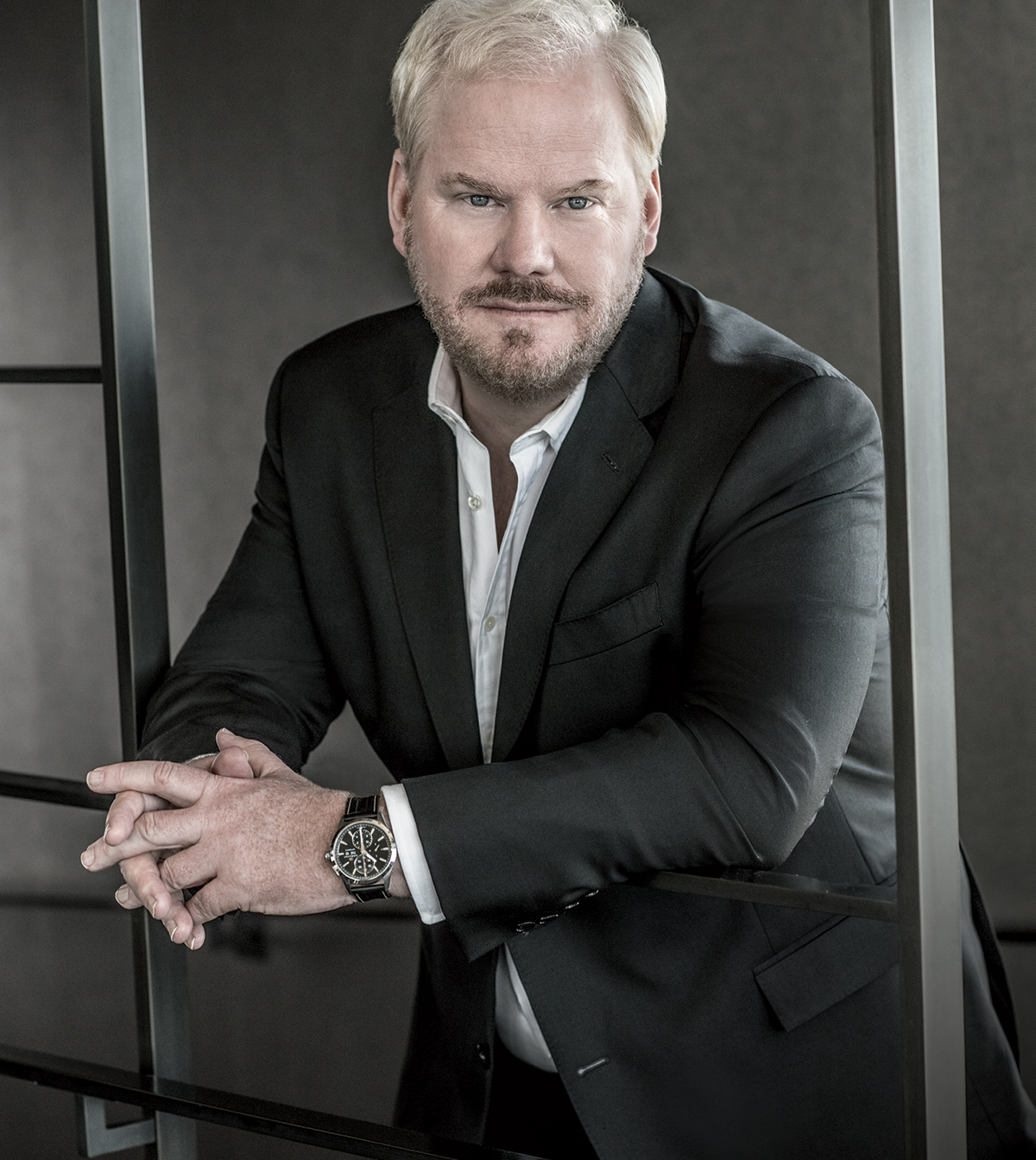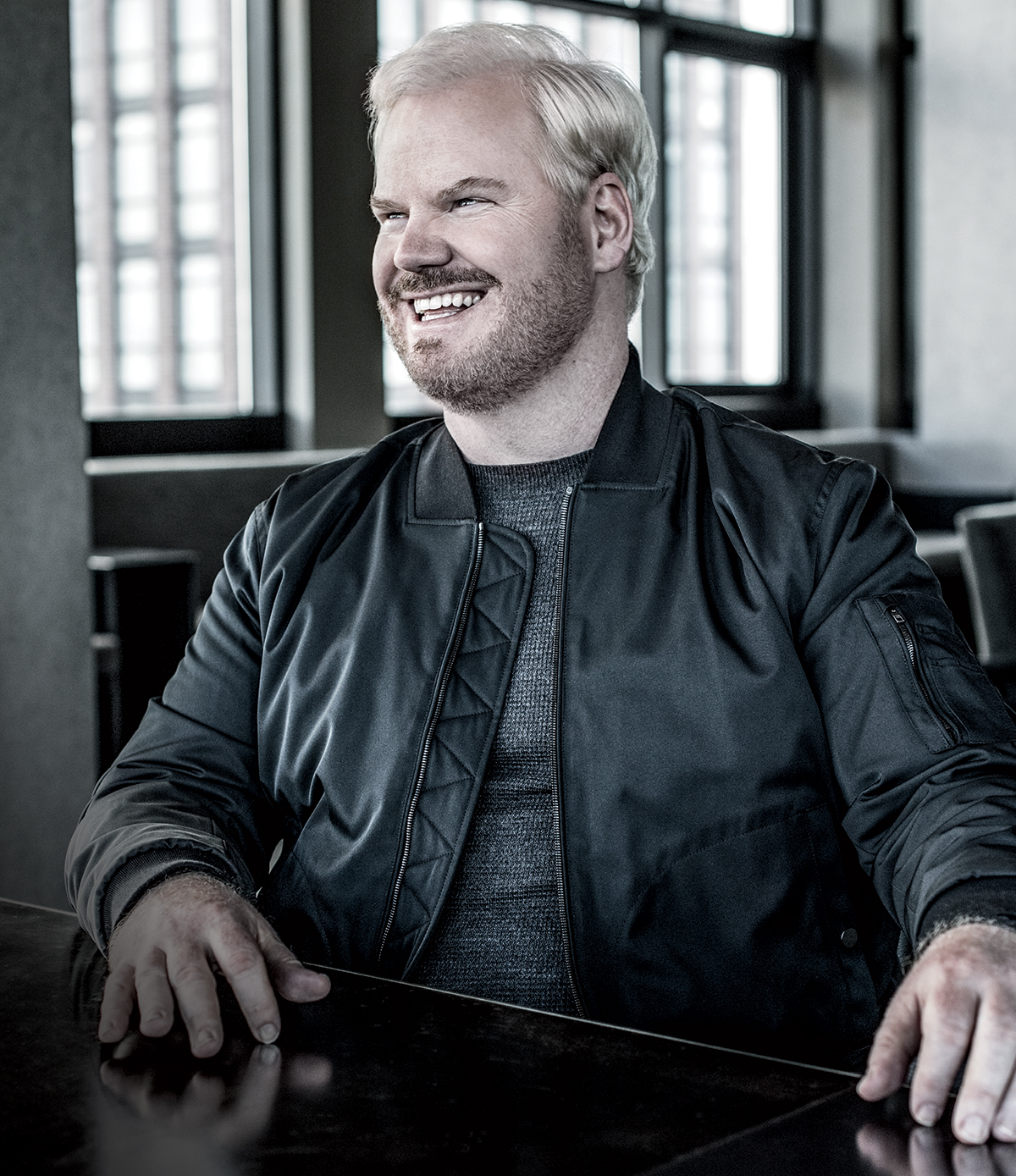JIM GAFFIGAN ON WHY CHICAGO FOOD PLAYS INTO HIS COMEDY & HOW THE MIDWEST SHAPED HIS IDENTITY
MICHIGAN AVENUE, OCTOBER 2016

From bestselling books and his own TV show to the crowds packing his current North American tour, Northwest Indiana native Jim Gaffigan is riding his hilarious brand of self-effacing humor to the top of the comedy scene.

Sport coat, Hickey Freeman ($1,195). Nordstrom, 55 E. Grand Ave., 312-464-1515. Sweater, Michael Kors ($145). Macy’s, 111 N. State St., 312-781-1000. T-shirt, Zachary Prell ($65). Nordstrom, see above
Jim Gaffigan may claim he’s “not interesting,” but don’t listen to him: His nuanced take on navigating the trials of everyday life as a food-obsessed father and husband has made him one of the past decade’s undisputed kings of comedy. In the past couple years alone, the Elgin-born, Indiana-raised comic has sold out Madison Square Garden; performed for Pope Francis and an audience of more than a million in Philadelphia; released his second New York Times bestseller, Food: A Love Story, and his fourth comedy special, Obsessed; and, with wife Jeannie, created The Jim Gaffigan Show for TV Land—all while raising five kids in Manhattan. With the show’s second season just wrapped, we caught up with Gaffigan in an exclusive interview in the midst of his national tour to talk about being “unsexy,” his passion for deep dish and Italian beef, and just what it means to be from the Midwest.
You’re starring, you’re writing, you’re running The Jim Gaffigan Show with your wife Jeannie—how are you balancing it all? We’re doing a really horrible job... [Seriously,] My wife has been my writing partner for like 15–20 years now, and it seems like it would be a horrible thing to do something like [a TV show] with your spouse or partner, but it’s our passion. If we didn’t have kids it would be no problem, but the fact that we have five kids really makes us kind of sit and go “Are we lunatics for doing this?” But it’s also good for the kids to see us engaged in something we’re passionate about.
How has the show evolved since it started last year?Jeannie and I started with this idea that initially was at NBC, and then it went to CBS, we did two rounds, and going through that network process means the show we’re doing right now has really grown so much away from what initially was the networks’ idea of what they wanted. Even when people hear “comedian, father, five kids,” they think the show is going to be like Full House, and it’s not. The network wanted it to be like that; we never wanted it to be like that. We ended up gearing it more towards interesting, compelling stories that we wanted to do. Because, you know, I love television, and I wanted to make sure it was a show that I would want to watch.
We live in a world that is so much about being your best self, and almost hiding your flaws, but your show is almost the opposite of that: You’re putting all of the flaws of this character front and center. What inspired that?My comedy is very self-effacing, and I think that we live in a day and age where people’s Facebook posts and Instagram posts almost emulate a star’s existence, when the reality is that we’re mostly dealing with frustration and hardship. So I think it’s a nice break to look at some of the dark sides of ourselves.

The patron saint of Dad Bod: With his humorous take on life as a white-bread, overweight Catholic guy from the Midwest, Jim Gaffigan has hit America’s funny bone dead on. Jacket,Brooks Brothers ($998). 713 N. Michigan Ave., 312-915- 0060. Shirt, Billy Reid ($245). 845 W. Randolph St., 312-614-1503. Trousers, Paul Stuart ($494). 107 E. Oak St., 312-640-2650. 43mm stainless steel Broadway Auto Chronograph watch, Hamilton ($1,895). New York Jewelers, 11 N. Wabash Ave., 312-855-4999
In the episode “Ugly,” you’re reading for the part of a “balding, pasty, repulsive troll of a man,” and everyone’s response is “Oh totally, you could totally do that,” even your wife. What does it take to write about a character based on yourself that lives in that kind of place?Part of me thinks we exist in this world where the entertainment industry is so fancy. People do a movie, and then they’re escorted into a room and they drink Champagne with, you know, George Clooney, when the reality is it’s just constant navigating the humiliation of life, which, you find that whether you’re a pipe fitter or a DJ; yeah, it seems pretty glamorous but—and the whole “Ugly” episode I think is just, we live in a very superficial culture and for every Kim Kardashian moment there’s a lot of awkwardness for everyone else.
Is it liberating to own that? I’ve lived with it for a while, as a character actor. Like as a comedian, you go on stage and the audience tells you exactly how you come across. I mean, I played football in high school and some in college, but I get cast as “nerdy guy.” You get educated really quickly on how you come across. You can either be highly offended or say Look, this is reality. There are all these attributes that I have that are really unsexy. I’m a white guy, I’m overweight, I have five kids, I’m Catholic—all these things that would make me personally go “I’m not interesting.” So it’s that honesty and self-awareness that I think people hopefully find engaging.
Do you feel like comedy is changing? I think comedy has changed. But as much as it changes, what I love and respect so much about comedians is that in the entertainment industry, stand-up comedy remains a meritocracy. So you either can do it or you can’t. It can shift—there are some people whose comedy doesn’t translate to another decade or whatever, but I think how we appreciate comedy is always changing. When I was in my 20s and 30s there was no YouTube, there was no Comedy Central; [whereas] I’ll do a show tonight and 15-year-olds will know more about stand-up comedy than most people did in their 40s fifteen years ago. The internet and satellite radio has changed it so much, but it also remains grounded in this meritocracy. Which sounds grandiose, but it’s unique to the entertainment world, because in the entertainment world someone can be famous for being good-looking or for doing something obnoxious. Where as a stand-up, you really got to get the job done.
“HOW I WAS RAISED, YOU CURSE WHEN YOU’RE ANGRY. SO IF I’M DOING A JOKE ABOUT DONUTS, IS IT NECESSARY TO CURSE? NOT REALLY.”
How is it being back on the road after the intensity of creating the show’s second season? Oh my gosh, it’s like a vacation. Performing for an hour and a half onstage and writing and noodling around during the day figuring out some of the bits, that’s nothing compared to the workload of 16-hour days working on the show. When I do stand-up, I can get my kids to bed [then go do a show] and come back—have a bit more of a life. I love acting, and I love working on my show, but some of it is just the hours. It seems cruel to get up and try to be funny at 6 am. That doesn’t make sense in any environment.
How important is it to have your family with you when you tour? Pretty important. I enjoy doing stand-up, but in the end, in those last moments of my existence, I’m not going to be sitting there going “I wish I had done another Netflix special.” I’m probably going to be thinking about whether I was a decent father and husband, right? Having my family with me keeps the priorities there. And I’m lucky enough that I can have them with me.
We live in such a food-obsessed society, and you play off your own obsession with food in your own way. Why does that work in your material? What I love about it is it’s universal and also very personal. As a comedian, the more specific you can make your point of view on something [the better]. And it clarifies the topic. If I bring up mayonnaise, I don’t have to spend time explaining what mayonnaise is. It’s universal. Then you just add your own point of view. And I do feel passionately about food—and particularly about Chicago food, ironically—and even if people don’t agree with me, they can understand the context of the humor. A vegetarian can still think my bacon jokes are funny. Does that make sense? Or if I say I love Chicago pizza, people can be angry but they also know we’re just talking about pizza, right? It’s not like I’m sitting there saying I support Trump.
The show has a running joke that nobody really cares where in the Midwest you’re from, because it’s all kind of the same. How close is that to reality? Pretty close, though obviously that’s done for humorous effect. But I also have another vein of insecurity because I’m from northwest Indiana, and I have jokes when I perform there about how people from Chicago don’t realize it’s ten minutes away. There’s definitely a geographic snobbery of the Northeast and Southern California of viewing the Midwest with a blanket statement. Chicago’s a very cosmopolitan city—way more cosmopolitan than most parts of Los Angeles—and so where does that come from? It comes from [the fact that] there’s something about Midwesterners. I mean look, Minnesota is very different from Chicago, but there’s a certain affability that masks an anger, but we’re polite enough to hide it. In the Northeast, the anger is much closer to the surface.
 Bomber jacket, Vince ($495). 106 E. Oak St., 312-280-6890. Sweater, APC ($220). Bloomingdale’s, 900 North Michigan Shops, 312-440-4460
Bomber jacket, Vince ($495). 106 E. Oak St., 312-280-6890. Sweater, APC ($220). Bloomingdale’s, 900 North Michigan Shops, 312-440-4460
How has being from the Midwest informed your own identity? I didn’t realize I was Midwestern until I came to the East coast. Like I remember as a kid, my family and I were on vacation in Puerto Rico and there was this family at a neighboring table, and they were yelling. I asked my dad, “What’s wrong with those people?” And he says “There’s nothing wrong with them—they’re New Yorkers.” That’s not to say that there aren’t Chicagoans that yell. Part of it is that I in a generic sense look Midwestern, right, which makes no sense—there isn’t a physical appearance [to Midwesterners]—but I’m this white bread guy. It probably informs me in that, look, I curse in everyday life, and I’ve cursed onstage, but how I was raised, you curse when you’re really angry, and so if I’m onstage and I’m doing a joke about donuts, is it necessary to curse? Not really. I think that’s more of a Midwestern thing. There’s a certain amount of reason behind the decision-making. But that’s my idealized view of it.
You mentioned being a fan of Chicago. What in particular do you love about the city? I’ve always had a strong attachment to Chicago, even as a kid taking the train in to go Christmas shopping at Water Tower, or for St. Patrick’s Day. That was the city I was always trying to convince my friend to go visit with me. As I got older, you know I’d always eaten deep dish and Italian beef, but it’s like the appreciation for the Chicago food—that’s my sweet spot. Like it makes perfect sense. The hot dogs I get, the Italian beef I get, the deep dish pizza I’m all over it. My brothers make fun of me and say the deep dish is mostly for tourists, and I’m like “Then I’m a tourist.” You know I can’t get into Chicagoland area and not get a deep dish and go into a food coma. Even going to Greektown as a teenager, Chicago was my world. I used to fall asleep listening to White Sox games. The first time I was drunk was at Butch McGuire’s, my brother lived there, and it was going to a Cubs game and drinking an Old Style. And it was horrible. Or going to the University Club with my dad when I was a little kid. All the reference points were there.
Fatherhood is such an important thing in your work. What does it mean to you to be a father? I would say it defines me. But part of me is like, Doesn’t it define everyone who has a kid, as a man? I don’t feel like I’m that rare. If you got a kid, that’s your gig, right? I’m not getting all Kahlil Gibran here, but that shit is your number one priority. And I’m not saying I’m any good at it. I’m just saying it’s an interesting thing.
PHOTOGRAPHY BY ERIC. LEVIN STYLING BY ANDY SALMEN. STYLING ASSISTANCE BY SARAH GENTILLION. GROOMING BY ALICIA CAMPBELL USING DR. HAUSCHKA AT SEE MANAGEMENT. LOCATION: INSTRATA NOMAD, 10 E. 29TH ST., NEW YORK, NY, 212- 213-9800
